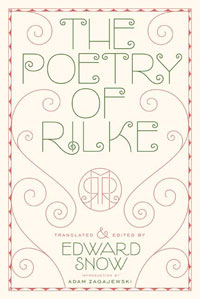A Relentless Pursuit of Beauty

If you can set aside (any) concerns about poetry in translation then you may rejoice at the publication of The Poetry of Rilke (FSG) edited by Edward Snow, a highly regarded contemporary translator of Rilke. This volume contains over 250 of the influential German poet’s work including complete translations of the “Sonnets to Orpheus” and the “Duino Elegies.”
This bilingual edition spans the entirety of Rilke’s work from The Book of Hours up to weeks before his death, with illuminating annotations by Snow. Poet Adam Zagajewski’s enlightening introduction, “Rereading Rilke,” claims:
The Notebooks of Malte Laurids Brigge
That doesn’t seem bombastic when you contemplate the poet Rilke’s view that “If your daily life seems poor, do not blame it; blame yourself that you are not poet enough to call forth its riches; for the Creator, there is no poverty.”
